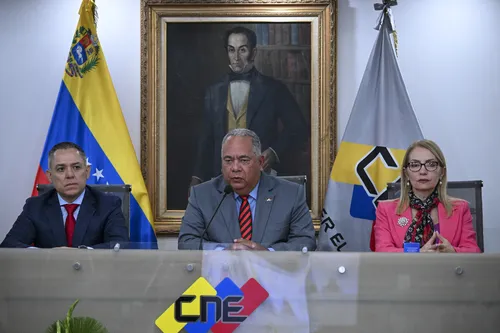
The National Electoral Council (CNE) of Venezuela announced this Tuesday (5) that the country’s presidential elections will be held on July 28. The date was chosen after a dialogue table promoted by the country’s National Assembly that brought together experts, politicians from different parties and representatives from various sectors of society, including the opposition.
The document proposed by the group had 27 possible dates for the 2024 elections and was signed by 152 people. The text was delivered to the National Electoral Council last Friday (1). The dialogue table opened on February 5th and lasted 23 days.
The president of the CNE, Elvis Amoroso, said that the date “complies with what was established in the Constitution of the Bolivarian Republic of Venezuela, the legal regulations and the entire process of studies carried out by the CNE”.
The voter registration period for candidates will be from March 18th to April 16th and the electoral campaign will be from July 4th to 25th.
The chosen date follows what was proposed in the Barbados agreement, a document signed between the government and part of the opposition in October 2023. The text defined that the election should be held in the second half of 2024 and would include observation missions from the European Union , the Carter Center and the United Nations (UN).
During the 8th summit of the Community of Latin American and Caribbean States (Celac) held last week in Saint Vincent and the Grenadines, Venezuelan President Nicolás Maduro said he had convened a delegation of observers from the United Nations (UN) and the Celac itself to monitor the 2024 election.
“Venezuela is preparing for absolutely reliable, transparent elections and with an electoral system that I would like Celac to know and be able to disseminate beyond manipulation and lies,” said Maduro.
July 28th will be on a Sunday and would also mark former president Hugo Chávez’s 70th birthday.
Opposition without defined candidate
Former deputy María Corina Machado, the main name to be a right-wing candidate in the election, was sanctioned by the Comptroller General of the Republic (CGR) with a disqualification from holding public office due to inconsistencies in her reporting while she was a deputy in the National Assembly (2011- 2014).
The CGR confirmed in June 2023 that Machado was disqualified for 15 years. Even so, the ultraliberal ran in the opposition primaries in October and won the dispute, putting herself forward for the election. The Electoral Chamber of the Superior Court of Justice (TSJ) confirmed the previous decision and suspended “all effects” of the primaries.
The opponent contests the process. In December 2023, María Corina appealed the decision, but the TSJ published the sentence this Monday, confirming the disqualification of the former deputy. In response, she said that she will run in the elections independent of the TSJ and called the trial a “judicial delinquency”. Corina received support from Paraguay, Argentina, Uruguay, Ecuador and the USA, which announced the resumption of sanctions after the TSJ decision.
The United States has exerted pressure on the Venezuelan electoral process. After resuming some economic sanctions, the country began to threaten the return of all coercive measures if Venezuela “did not respect the Barbados agreement by April”. The Ministry of Foreign Affairs published a note calling the US decision an “attempt at blackmail and meddling in internal issues” and which seeks to impose a “coup” in Venezuela.
Editing: Lucas Estanislau
Source: www.brasildefato.com.br

